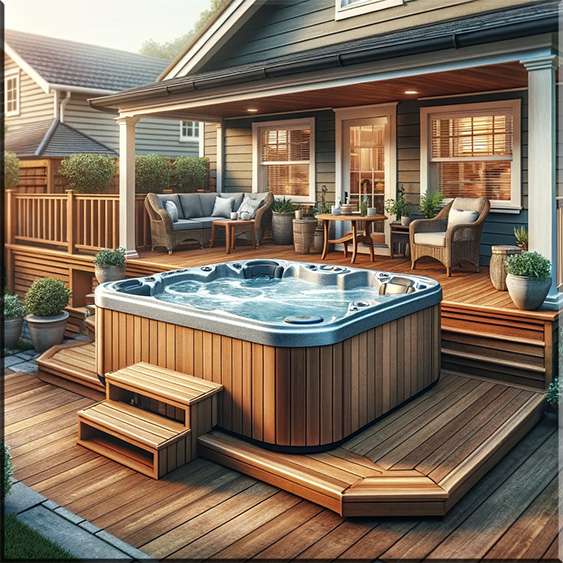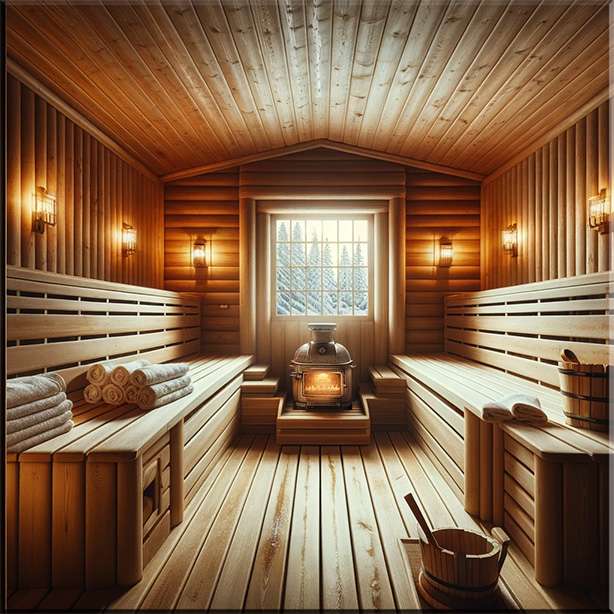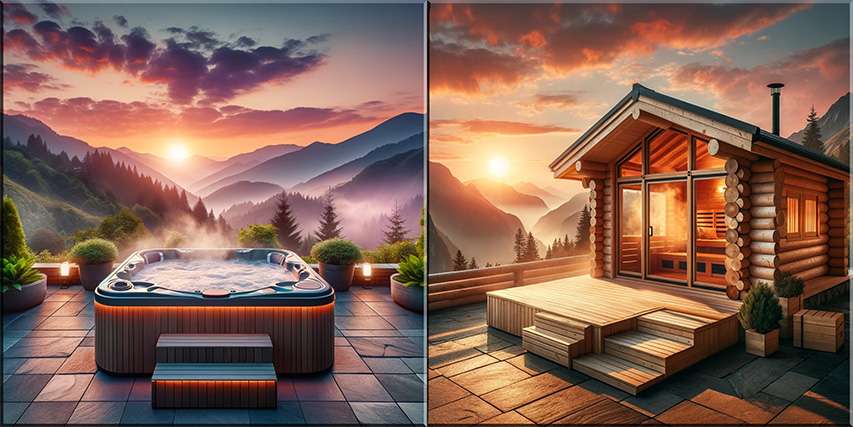Hot tubs and saunas are two popular options for enhancing your home’s relaxation and wellness amenities. Each offers unique benefits and experiences to improve your health, stress, and social life. However, choosing between a hot tub and a sauna can be challenging, as it involves weighing various factors like cost, health benefits, maintenance requirements, and space considerations. Moreover, personal preferences play a crucial role in making this decision.
This blog post aims to comprehensively compare hot tubs and saunas, exploring their pros and cons to help you make an informed decision. Whether you’re looking for a way to unwind after a long day, seeking health improvements, or considering adding value to your home, understanding the differences between these two relaxation options is key. We’ll examine everything from initial costs and installation requirements to the ongoing maintenance and the health benefits each option offers.
Choosing the right addition to your home wellness routine requires careful consideration of your lifestyle, budget, and space availability. By the end of this post, you’ll understand what hot tubs and saunas can offer, allowing you to choose what best suits your needs and preferences.
What is a Hot Tub?
A hot tub, often called a spa, is a large tub or small pool full of heated water used for relaxation, hydrotherapy, or socialization. The concept of hot tubs dates back thousands of years to when natural hot springs were the first sources of thermal baths. Over time, these natural phenomena were emulated through the development of artificial hot tubs, which have evolved significantly with advances in technology and design.
Modern hot tubs are equipped with jets that provide massages to the users. These jets circulate water with significant force, allowing for therapeutic muscle relaxation and stress relief. Hot tubs can be found in various forms, from portable and inflatable models to more permanent fixtures that are often integrated into outdoor patios or decks.
There are several popular types of hot tubs, each offering unique features:

1. Above-Ground Hot Tubs:
These are the most common type, made from durable materials such as acrylic, fiberglass, or polyethylene. They are designed to be placed on the ground and can be relocated if necessary.
2. In Ground Hot Tubs
These hot tubs are permanently installed into the ground and are often custom-built to match the homeowner's preferences and the landscape's design. They tend to be more expensive due to the construction and installation process.
3. Portable Hot Tubs
As the name suggests, these hot tubs can be moved from one location to another. They are typically less expensive and are a good option for those who rent their homes or have limited space.
4. Inflatable Hot Tubs:
These are the most affordable and straightforward installation. Made from durable vinyl or similar materials, inflatable hot tubs can be set up quickly and stored away when unused.
Hot tubs are not just a luxurious addition to one’s home; they offer various health benefits, including improved circulation, relaxation, and muscle and joint pain relief. They have become popular for those looking to add a recreational feature to their homes that contributes to their overall well-being.
In the following sections, we will explore the advantages and drawbacks of purchasing a hot tub, providing insights into what potential buyers should consider before investing.
Pros Of Buying A Hot Tub
Owning a hot tub has many benefits, from providing a relaxing retreat in your backyard to offering various health advantages. Here’s a closer look at the positive aspects of investing in a hot tub:
1. Relaxation & Stress Relief
As the name suggests, these hot tubs can be moved from one location to another. They are typically less expensive and are a good option for those who rent their homes or have limited space.
2. Muscle Relaxation & Joint Pain Relief:
A hot tub combines hot water and jets to relieve muscle tension and pain. The buoyancy of the water reduces body weight, relieving pressure on joints and facilitating easier movement. This can be particularly beneficial for those with arthritis or chronic pain.
3. Social Benefits:
A hot tub combines hot water and jets to relieve muscle tension and pain. The buoyancy of the water reduces body weight, relieving pressure on joints and facilitating easier movement. This can be particularly beneficial for those with arthritis or chronic pain.
4. Potential Increase In Home Value:
While not the primary reason to purchase a hot tub, it's worth noting that a well-maintained spa can increase the appeal and value of your property. A hot tub can be an attractive feature for potential buyers, making it a worthwhile investment for those considering future resale.
5. Health Benefits:
Beyond relaxation and pain relief, regular hot tub use has been associated with several other health benefits, including improved circulation, reduced symptoms of certain skin conditions, and even potential weight loss. The heat from the water helps to open up blood vessels, improving circulation and promoting healing in damaged tissues.
6. Year-Round Use:
Unlike pools, hot tubs can be used throughout the year, offering a warm, comforting escape even during the colder months. This makes them a versatile addition to any home, providing value and enjoyment regardless of the season.
Despite these significant advantages, owning a hot tub has drawbacks. The following section will cover the cons of buying a hot tub, including cost, maintenance, and space requirements, to give you a well-rounded perspective on what owning a hot tub entails.
Cons Of Buying A Hot Tub
While the allure of a hot tub is undeniable, potential buyers should also be aware of the challenges and downsides associated with ownership. Considering these cons is essential for making an informed decision that aligns with your lifestyle and budget.
1. Initial Cost & Installation:
The purchase price of a hot tub can be high, especially for high-end models or those requiring custom installation. In addition to the upfront cost, installation may involve expenses such as preparing a stable foundation, electrical work, and possibly plumbing modifications. These costs can add up, making it a significant investment.
2. Maintenance Requirements:
This includes monitoring and balancing the water chemistry, cleaning the filters, and periodically draining and refilling the tub. Neglecting maintenance can lead to issues like water imbalance, damaging the hot tub, and posing health risks to users.
3. Space Requirements:
Hot tubs, particularly permanent models, require a dedicated space in your home or yard. This space must accommodate the hot tub itself and allow for easy access and maintenance. Finding a suitable location can be a challenge for those with limited outdoor space.
4. Energy Consumption:
Operating a hot tub can significantly increase your energy bills. The cost of heating the water, especially in colder climates or during winter months, can be substantial. While newer models are designed to be more energy-efficient, the ongoing expense is a critical factor to consider.
5. Weather Dependency:
While hot tubs can be used year-round, their enjoyment can be weather-dependent. Extreme weather conditions, such as heavy snow, thunderstorms, or excessive heat, can limit their use. Additionally, outdoor hot tubs are exposed to the elements, which can accelerate wear and tear if not properly maintained.
6. Privacy Concerns:
Privacy can be an issue depending on the placement of your hot tub and the layout of your property. You may need to invest in fencing, landscaping, or privacy screens to ensure a secluded and comfortable environment.
Understanding these cons is crucial for anyone considering adding a hot tub to their home. While the benefits are numerous, the costs, maintenance, and space considerations must be carefully weighed against your personal preferences and circumstances.
Next, we will focus on saunas, exploring what they are, how they work, and the available types. This comparison will further aid in deciding which option—hot tub or sauna—is the best fit for your wellness and leisure needs.
What is a Sauna?
A sauna is a small room or house designed to experience dry or wet heat sessions, which can have therapeutic benefits for the user. Originating from Finland over 2,000 years ago, the sauna has become a global phenomenon, appreciated for its health benefits and social and cultural significance. Saunas operate by generating typically dry heat; however, traditional Finnish saunas can throw water on hot stones to produce steam and increase humidity.
Saunas function through various heating mechanisms, which include wood burning, electric heaters, or infrared technology. The heat in a sauna ranges typically between 70°C (158°F) and 100°C (212°F), with the humidity level controlled by the users’ preference for dry or wet heat.
There are three main types of saunas, each offering a unique experience:

1. Traditional Finnish Saunas:
These are wood-lined rooms with a wood or electric stove that heats the room to high temperatures. Water can be poured over the heated rocks to produce steam, increasing the room's humidity.
2. Infrared Saunas:
Unlike traditional saunas that heat the air, infrared saunas use infrared lamps to warm your body directly. This allows for a lower ambient temperature, making the experience more comfortable for some users while still providing the benefits of heat therapy.
3. Steam Rooms (Turkish Saunas):
While not traditionally saunas, steam rooms share similar health benefits. They generate steam, providing a high-humidity experience and offering a different kind of heat therapy than saunas' dry heat.
The choice between these sauna types depends on personal preference for heat, humidity, and the overall experience. Much like hot tubs, Saunas are sought after for their relaxation and health benefits, offering a peaceful retreat from the stresses of daily life.
In the following sections, we’ll explore the pros and cons of buying a sauna, including the health benefits, maintenance considerations, and the impact on your lifestyle and home.
Pros Of Buying A Sauna
Investing in a sauna can enrich your life in numerous ways, from enhancing your health and wellness routine to providing a tranquil space for relaxation and reflection. Here are the primary benefits of owning a sauna:
1. Detoxification & Improved Circulation:
One of the most celebrated benefits of sauna use is its ability to promote detoxification. Sweating induced by the high heat helps flush toxins from the body. Additionally, the heat improves circulation by expanding blood vessels, which aids in muscle recovery, reduces stiffness, and promotes a healthy heart.
2. Stress Relief & Relaxation:
Saunas provide a warm, quiet space without distractions. The heat helps to relax muscles, calm the mind, and relieve stress. This environment is perfect for meditative practices or simply unwinding after a long day, contributing to improved mental health and well-being.
3. Skin Health:
Regular sauna sessions can positively impact skin health. The sweating process helps to cleanse pores, while increased circulation promotes the delivery of nutrients to the skin, leading to a clearer, healthier complexion.
4. Pain Relief:
The heat from a sauna can ease pain from conditions like arthritis, headaches, and muscle soreness by increasing blood flow and reducing inflammation. This can provide a natural form of pain relief and enhance the body's healing process.
5. Improved Respiratory Function:
For those with respiratory issues, the warm air of a sauna can help open airways, loosen phlegm, and reduce congestion. This is particularly beneficial in steam saunas, where the humidity can aid in respiratory therapy.
6. Low Maintenance:
Compared to hot tubs, saunas require less maintenance. There's no need to worry about water chemistry or filtration systems. Basic care involves ensuring the space is clean, and the heater (or steam generator) is in good working order.
7. Efficient Use Of Space:
Saunas can be installed in various spaces, both indoors and outdoors. They come in several sizes, from small one-person units to larger models that accommodate multiple people, making them adaptable to different living situations.
8. Energy Efficiency
Infrared saunas are known for their energy efficiency. They heat up faster and use less electricity than traditional saunas, making them a cost-effective option in the long run.
While saunas offer a range of benefits, there are also cons to consider before purchasing. The following section will explore the potential drawbacks of buying a sauna, including cost, installation, and use considerations, to provide a balanced view of sauna ownership.
Cons of Buying A Sauna
While saunas offer numerous benefits, there are also some drawbacks to consider before purchasing. Understanding these cons can help you make an informed decision that aligns with your needs and expectations. Here are some potential downsides of owning a sauna:
1. Initial Cost & Installation:
The upfront cost of purchasing and installing a sauna can be significant. High-quality traditional and infrared saunas come with a hefty price tag, especially for larger models or those with advanced features. Installation costs can also increase, particularly if you need to make structural changes to your home or upgrade your electrical system to accommodate the sauna.
2. Space Requirements:
Although saunas are generally more space-efficient than hot tubs, you still need to allocate a dedicated area in your home for the sauna. This might be challenging for those with limited space. Additionally, the location needs to support the sauna's weight and have access to an appropriate power source.
3. Limited Social Use:
Saunas are typically designed for relaxation and health benefits rather than socializing. While some larger models can accommodate multiple people, the experience is more solitary or intimate than a hot tub's communal atmosphere. This might be a drawback for those looking to entertain guests.
4. Heat Intolerance:
Not everyone can tolerate the high temperatures of a traditional sauna, which can limit its use for certain individuals. People with certain medical conditions, such as low blood pressure or heart problems, may need to consult with a doctor before using a sauna. Infrared saunas offer a milder alternative, but heat sensitivity can still be an issue for some.
5. Maintenance & Cleanliness:
While generally low maintenance, saunas require regular cleaning to prevent the build-up of bacteria and ensure a hygienic environment. Infrared saunas need their surfaces wiped down after use, and traditional saunas may require more extensive cleaning due to the use of water and steam.
6. Longevity & Repair Costs:
High temperatures and humidity levels can wear down sauna components over time, potentially leading to repair or replacement costs. Quality construction and materials can mitigate this, but long-term maintenance is essential.
Despite these potential drawbacks, for many, the benefits of sauna ownership—such as improved health, relaxation, and the convenience of having a personal wellness retreat at home—outweigh the cons. When considering a sauna, it’s crucial to weigh these factors against your preferences, lifestyle, and the benefits you hope to gain.
In the next section, we will conduct a comparative analysis of hot tubs versus saunas, helping you further understand which option best suits your needs based on various factors such as cost, health benefits, maintenance, and space requirements.
Comparative Analysis: Hot Tub vs. Sauna
When deciding between a hot tub and a sauna, several factors come into play, each contributing to your overall satisfaction and the benefits you’ll derive from your investment. This comparative analysis focuses on key aspects such as cost, health benefits, maintenance, space requirements, and personal preference, aiming to provide a clearer picture of which option better suits your lifestyle.
Costs

Hot Tubs:
Due to the complexity of their systems and the need for ongoing maintenance, hot tubs generally have a higher initial cost. The cost includes purchase, installation, and operational expenses such as electricity and water treatment chemicals. Hot tubs cost about $2,000 to $35,000. The cost depends on size, make, model, material, features, and brand. Hot tubs can last 5 to 20 years.
Saunas:
Saunas tend to have a lower initial cost than hot tubs, especially if opting for an infrared model. (Somewhere between $3,000 and $6,000). Depending on the type and maintenance, Saunas can last 15-50 years.
Health Benefits

Hot Tubs:
Ideal for muscle relaxation, joint pain relief, and improving circulation through hydrotherapy. The buoyancy of water reduces strain on joints, making it excellent for recovery from injuries or alleviating conditions like arthritis.
Saunas:
Excellent for detoxification through sweating, improving cardiovascular health, and relieving stress. The dry heat can also benefit respiratory conditions and skin health by opening pores and improving circulation.
Maintenance

Hot Tubs:
Require regular maintenance to keep the water clean and chemically balanced, which can be time-consuming and costly. They also need periodic checks on their mechanical and electrical systems. Hot tubs cost $500-$1,000 annually to maintain, and it can add $50-$100 per month to the electric bill depending on the mode, size, usage, and climate.
Saunas:
Typically demand less upkeep than hot tubs, with infrared models needing just basic surface cleaning and traditional saunas requiring some attention to the wood and heating elements. Annually, maintenance costs for saunas are typically 1-4% of their purchase price, translating to $30 to $120 for a $3,000 sauna. The cost of operation is more affordable as well; a two-person sauna might cost around $1.40 to $2.60 in electricity in a single sauna session. This varies by location, usage frequency, brand, and the type of energy used. Unlike hot tubs, saunas don't require water treatments.
Space Requirements

Hot Tubs:
Need a significant amount of space, usually outdoors, and a solid, level foundation to support the tub's weight filled with water and occupants.
Saunas:
Are more flexible in terms of placement and can be installed indoors or outdoors, requiring less space than a hot tub. This makes them more adaptable to smaller homes or spaces.
Personal Preference

Ultimately, the decision between a hot tub and a sauna may come down to personal preference and lifestyle:
Hot Tubs:
These are social spaces conducive to entertaining friends or family gatherings. They offer a unique combination of hydrotherapy and relaxation under the open sky, which can be particularly appealing for those looking to enhance their home entertainment options.
Saunas:
Offer a more solitary or intimate experience focused on health and wellness. They appeal to those seeking a quiet, meditative space for relaxation and detoxification without the maintenance and operational costs associated with hot tubs.
Conclusion
Choosing between a hot tub and a sauna is a personal decision that depends on various factors, including your budget, health and wellness goals, available space, and how you plan to use it. While hot tubs offer social and hydrotherapeutic benefits, saunas are prized for their health benefits and ease of maintenance. Ultimately, the best choice is the one that aligns with your lifestyle, preferences, and the specific benefits you wish to gain from the experience.
For personalized advice and to explore a wide range of options, consider visiting Love’s Hot Tubs. With flexible consultation hours Monday through Friday by appointment and open hours on Saturday from 10 AM to 5 PM, Love’s Hot Tubs is dedicated to helping you find the perfect addition to your home. For more information or to schedule an appointment, call 208-353-2170 or visit loveshottubs.com.
Your journey towards relaxation and wellness starts with making the right choice for your lifestyle. Whether it’s the social and therapeutic embrace of a hot tub or a sauna’s serene, health-focused retreat, each offers a unique path to achieving personal well-being and enhancing your home environment.

